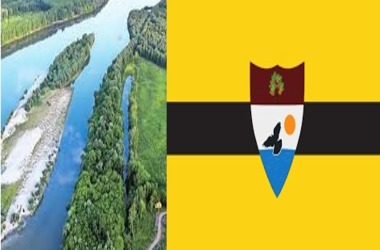
The Metaverse Genesis:
Before its physical construction, Liberland existed solely in the metaverse, where individuals could purchase land and establish businesses using cryptocurrency. The metaverse, designed to mirror the real-life Liberland, featured a picturesque island surrounded by a lake, greenery, and futuristic structures. Acting as a crypto networking hub, the virtual nation boasted a population of 500,000 locals.
Transition to the Physical Realm:
Liberland’s metamorphosis from a digital entity to a tangible nation commenced in 2015 when Vit Jedlicka declared it a state, complete with a flag, coat of arms, national anthem, and its own cryptocurrency, Liberland Merit. The president’s vision for Liberland is to be the “freest country in the world,” with Bitcoin as the sole currency and a commitment to no taxes or gun control.
Challenges and Triumphs:
After enduring more than eight years of disputes, Liberland opened its borders in August, allowing the construction of a physical city to commence. The island, originally uninhabited and overlooked by Croatia and Serbia after the Yugoslav wars, is now witnessing the realization of President Jedlicka’s dream. Despite initial arrests and challenges, including Jedlicka’s own detainment, Liberland’s Foreign Minister Thomas Walls expressed pride in being part of the nation’s inaugural wave of inhabitants.
Building a Real Community:
Liberland’s transformation is marked by the establishment of essential infrastructure, including a yacht house, a pub, a radio station, and ongoing construction of wooden houses. A primary school and a hotel are also in the works, envisioning a thriving community of 1,000 residents by the end of 2023. The nation recently celebrated its first wedding, indicating a shift from a digital concept to a real, vibrant community.
Diplomatic Endeavors and Future Plans:
Thomas Walls, Liberland’s foreign minister, described compatriots as “national heroes” contributing to the nation’s reality. Diplomatic efforts extend to improving relations with countries worldwide, with delegations engaging nations in Latin and North America, Europe, the Middle East, Africa, and Asia. Liberland, covering a mere 7 square kilometers, aspires to bridge East and West, acting as a catalyst for blockchain governance and cryptocurrency innovation.
Global Recognition and Citizen Aspirations:
Despite its small size, Liberland aims for global recognition and prosperity. Over 500,000 people have applied for real passports with the Liberland approval mark, becoming official citizens without setting foot on the island. Aspiring resident Ben Miller expressed his interest, citing a libertarian perspective and a desire for a unique, rule-free experience for his family.
Metaverse Architecture Collaboration:
The transition from the metaverse to reality involved a collaborative effort between Liberland, Zaha Hadid Architects, Mytaverse, and ArchAgenda. Zaha Hadid Architects’ Patrik Schumacher emphasized the island’s role as a standalone virtual reality space, aiming to become a hub for networking and collaboration in the emerging Web 3.0 industry.
Conclusion:
Liberland’s journey from a digital metaverse concept to a tangible nation showcases innovation, resilience, and a commitment to freedom. As it continues to build its physical community and engage in diplomatic endeavors, Liberland stands as a unique experiment in nation-building, challenging traditional norms and embracing blockchain technology and cryptocurrency as cornerstones of its identity.